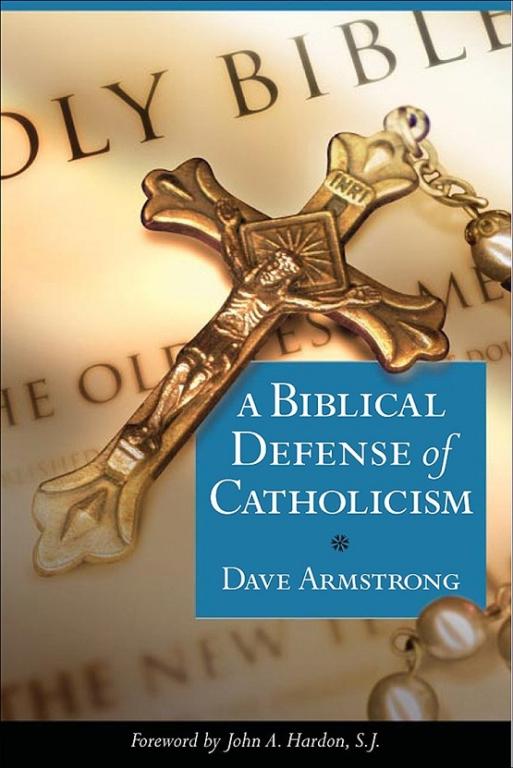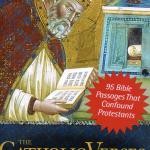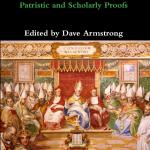
(Book and purchase information)
***
(12-11-04)
***
This is a counter-reply to a response to my best-selling pamphlet for Our Sunday Visitor, Top Ten Questions Catholics Are Asked, by Church of Christ preacher Kevin Cauley. His words will be in blue. Words from my pamphlet will be in green.
***
Complete Five-Part Series:
Part I: Introduction and Church of Christ Information
Part II: Tradition / Papacy
Part III: “Father” / Purgatory / Statues / Confession
Part IV: Mary / Eucharist
Part V: Salvation (+ Purgatory Again)
***
IV. “If you died tonight, would you go to heaven?”
1. Catholicism says,
1) “…To enter heaven, one must be perfectly holy.”
2) “The cleansing and purifying of any remaining sin, which makes us fit for God’s holy presence, is what Catholics call purgatory.”
3) They cite 1 Corinthians 3:13, 15 as justification for this doctrine.
2. The Bible says,
1) The blood of Christ perfectly cleanses us from all sin, not purgatory.
a. Hebrews 9:14 “How much more shall the blood of Christ, who through the eternal Spirit offered himself without spot to God, purge ”
b. Hebrews 10:14 “For by one offering he hath perfected for ever them that are sanctified.”
c. To suggest that somehow the blood of Christ does not take away all of our sins and that we need to go to purgatory to have them completely cleansed away is complete and utter heresy.
Absolutely not. Purgatory has no relation to the notion that Jesus’ work for us is somehow incomplete. Everyone who is in purgatory is saved already. Purgatory does not save them. It only prepares the saved soul for heaven. So all of the above is a moot point. If Mr. Cauley doesn’t like purgatory, then let him argue against the biblical evidence offered for it, rather than declaim and proclaim what he would like to be true, without dealing with the biblical passages that Catholics have offered in defense of this doctrine. 1 Corinthians 3 is a very striking and explicit proof indeed (I guess that’s why Mr. Cauley refused to explain it in a way other than I did).
2) That the faithful who die go to “paradise” and the wicked go to torments.
a. Luke 23:43. Paradise.
b. Luke 16:23. Rich man in torments.
The Bible teaches that even those who are saved will undergo a trial or a purging of their sins. It’s very clear. 1 Corinthians 3:11-15 teaches this:
For no other foundation can anyone lay than that which is laid, which is Jesus Christ. Now if any one builds on the foundation with gold, silver, precious stones, wood, hay, stubble – each man’s work will become manifest; for the Day will disclose it, because it will be revealed with fire, and the fire will test what sort of work each one has done. If the work which any man has built on the foundation survives, he will receive a reward. If any man’s work is burned up, he will suffer loss, though he himself will be saved, but only as through fire.
If that isn’t good enough, there is 2 Corinthians 5:10, which Mr. Cauley himself cites below:
For we must all appear before the judgment seat of Christ, so that each one may receive good or evil, according to what he has done in the body.
3) That one day, all will be raised from the grave to be judged.
a. Acts 24:15 resurrection of the just and unjust.
b. 2 Cor. 5:10 All appear before judgment seat of Christ.
No argument there . . .
4) 1 Cor. 3:13, 15 is not speaking of our own personal works of salvation. That passage is in reference to those who we bring to Christ–other people.
Why does Mr. Cauley believe this? Until he gets more in-depth with his exegesis than one-line proclamations, why should I waste more of my time trying to dispute the meaning of passages with him?
5) There is no indication in scripture that anyone will ever go to a place called “Purgatory” or “Limbo” or any other such place than paradise or torments, and then eventually, heaven and hell.
Then let Mr. Cauley or someone else who believes this grapple with the abundant biblical indications, compiled in my papers from my Purgatory Index Page.
V. Are you saved?
1. Catholicism says…
1) “Catholics can be as sure as anyone else that they are in God’s good graces.”
2) “Likewise, St. Paul does not regard salvation as a one-time event, but as a goal to be sought after, one that can be lost….”
2. The Bible teaches
1) Yes we are saved! Acts 16:30.
This doesn’t prove instantaneous salvation, because the word for “believe” in Greek (pistuo) also incorporates actions and work on our part. Many passages warn against falling away. See my papers:
Assurance of Instant Salvation? / Apostasy / Falling Away
“Once Saved, Always Saved”: Is it Biblical? Antinomian?
“Certainty” of Eternal Life? (1 John 5:13 and John 5:24)
Bible on the Moral Assurance of Salvation (Persevering in Faith, with Hope)
2) We are saved by Grace. Ephesians 2:8. We don’t merit our own salvation.
Catholics agree with this. Hence, the decrees from Trent:
CANON I.-If any one saith, that man may be justified before God by his own works, whether done through the teaching of human nature, or that of the law, without the grace of God through Jesus Christ; let him be anathema.
CANON II.-If any one saith, that the grace of God, through Jesus Christ, is given only for this, that man may be able more easily to live justly, and to merit eternal life, as if, by free will without grace, he were able to do both, though hardly indeed and with difficulty; let him be anathema.
CANON III.-If any one saith, that without the prevenient inspiration of the Holy Ghost, and without his help, man can believe, hope, love, or be penitent as he ought, so as that the grace of Justification may be bestowed upon him; let him be anathema.
3) When we obey the gospel of Christ, then we are accepting the grace of God in our lives.2 Cor.6:1 “We then, as workers together with him, beseech you also that ye receive not the grace of God in vain.”
Amen!
4) Catholics teach the truth regarding the possibility of apostasy.
5) However, Catholicism teaches salvation of merit based on works.
This is untrue. What Mr. Cauley describes is the ancient heresy of Pelagianism, which we reject.
See my papers:
Does Catholic Merit = “Works Salvation”?
Merit: Clarification of the Catholic Doctrine: Condign and Congruous Merit, Prevenient Grace, Etc.
Grace Alone: Perfectly Acceptable Catholic Teaching
For many further papers on all aspects of salvation, soteriology, faith, justification, etc., see my Salvation & Justification web page.
***













